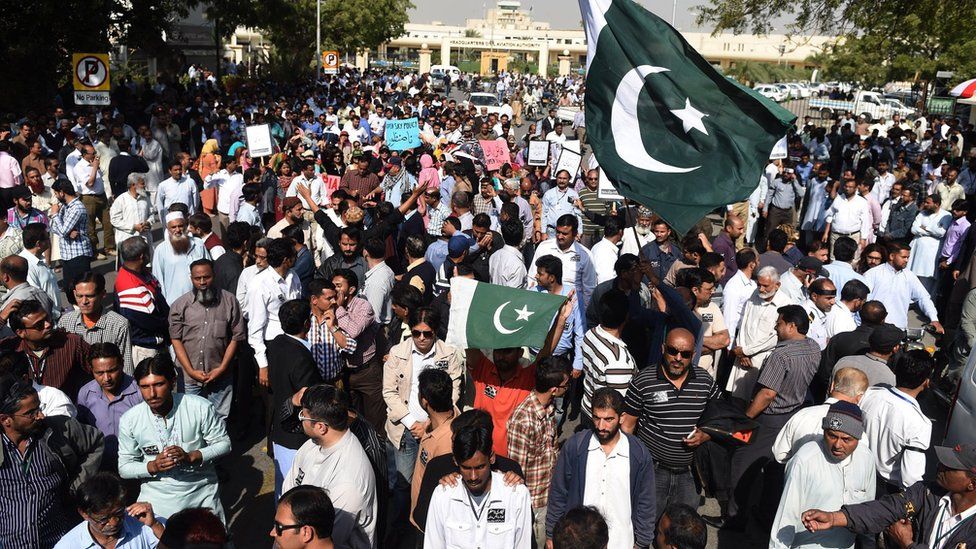
- Proposed Legislation to Restrict Public Assemblies: Pakistan’s ruling party, PML-N, introduced the “Peaceful Assembly and Public Order Bill 2024,” which seeks to regulate public demonstrations by allowing city officials in Islamabad to assess the law-and-order situation before permitting any public gatherings. The bill also defines high-security zones where assemblies are prohibited.
- Political Opposition and Criticism: The bill has sparked significant criticism, particularly from the Pakistan Tehreek-e-Insaf (PTI) party, which views it as an attempt to stifle dissent and restrict the freedom of assembly. PTI leaders argue that the legislation is designed to suppress opposition ahead of the national elections in February 2025.
- Security Concerns as Justification: The government justifies the proposed ban on public assemblies by citing increased insecurity, especially in Khyber-Pakhtunkhwa and Baluchistan, where violence has been rising. However, critics question whether the legislation is truly motivated by security concerns or is instead a strategy to centralize power and suppress political opposition.
Recently, the Shahbaz Sharif-led government in Pakistan suggested outlawing public assemblies and demonstrations, a move that has drawn strong opposition. In light of the anticipated political unrest, this idea calls into question the nation’s democracy and civil freedoms.
Overview of the Proposed Legislation
On September 2, 2024, Pakistan’s ruling party, the Pakistan Muslim League-Nawaz (PML-N), presented the “Peaceful Assembly and Public Order Bill 2024” to the Senate. Although this bill seeks to regulate public demonstrations, its principal objective is to allow city officials in Islamabad to assess the law-and-order situation before permitting any public demonstration. It also enables the implementation of provisions that would define certain areas as ‘high-security zones,’ within which assemblies are prohibited. The legislation further requires events to be held at approved locations, during permitted times, and along designated routes, emphasizing that the right to freedom of assembly and procession is not absolute and is subject to “reasonable restrictions in the interest of public order, morality, and the protection of State security.”
Context of the Ban

The proposed legislation comes at a strategic time, coinciding with a planned mass protest by the Pakistan Tehreek-e-Insaf (PTI) party, led by the incarcerated former Prime Minister Imran Khan. Following the introduction of the bill, the PTI has accused the government of using the legislation to harass its members and curtail the freedom of action of political parties. The party leadership has argued that even if they are permitted to hold a rally, this permission may be revoked at any time, meaning organizers could face up to three years in prison for unlawfully assembling rallies.
Security Concerns
The government has cited increased insecurity as justification for the proposed ban, particularly in the wake of rising violence from groups in Khyber-Pakhtunkhwa and Baluchistan. Reports indicate that 59 acts of violence were committed in August alone, raising concerns about government authority in the capital city, Islamabad. Political envoys have also questioned the government’s ability to manage security, which in turn raises questions about the true motive behind the ban on public assemblies.
Political Implications
Many political analysts consider such legislation part of the government’s strategy to centralize power and suppress opposition. Operating under the assumption that the bill is not solely motivated by security concerns, many believe the legislation is targeted at opposition parties and protests, particularly given the current political environment. The leadership of the Pakistan Tehreek-e-Insaf (PTI) has called this bill an infringement on democracy, claiming its primary goal is to ‘gag’ the PTI in anticipation of the upcoming national elections, scheduled for February 2025.
Public Reaction and Opposition

The proposed ban has attracted criticism from various political factions and civil society organizations, with many viewing it as an encroachment on the freedom of assembly and an attempt to stifle dissent. The PTI has been the most vocal in its opposition to the bill, arguing that it erodes democracy and the freedom to assemble. This has created significant controversy, leading to the bill being sent to a parliamentary committee for further review and analysis, highlighting the sensitivity of this legislative proposal.
The issues raised by this legislation are particularly evident in the context of the political turmoil and critical years ahead for Pakistan’s political life. The legislation cannot deny citizens their right to free speech. The situation remains unclear, and the outcome of this legislative process will be closely observed by both domestic and international stakeholders.
References:
- Why is Pakistan planning to ban rallies and public gatherings in Islamabad?- https://www.aljazeera.com/news/2024/9/4/why-is-pakistan-planning-to-ban-rallies-and-public-gatherings-in-islamabad
- Islamabad police ban public gatherings in view of ‘elevated security concerns’ – https://www.arabnews.com/node/2569560/pakistan
- Rallies, public gathering banned for four days in Red Zone- https://www.dawn.com/news/1849697
- Senate panel approves three-year jail for unauthorised rallies in Islamabad-https://tribune.com.pk/story/2493324/senate-panel-approves-three-year-jail-for-unauthorised-rallies-in-islamabad
Parag Gilada is a Mukherjee Fellow who has recently graduated from the Jindal School of International Affairs with a keen interest in Sports Diplomacy. Views expressed are the author’s own.
